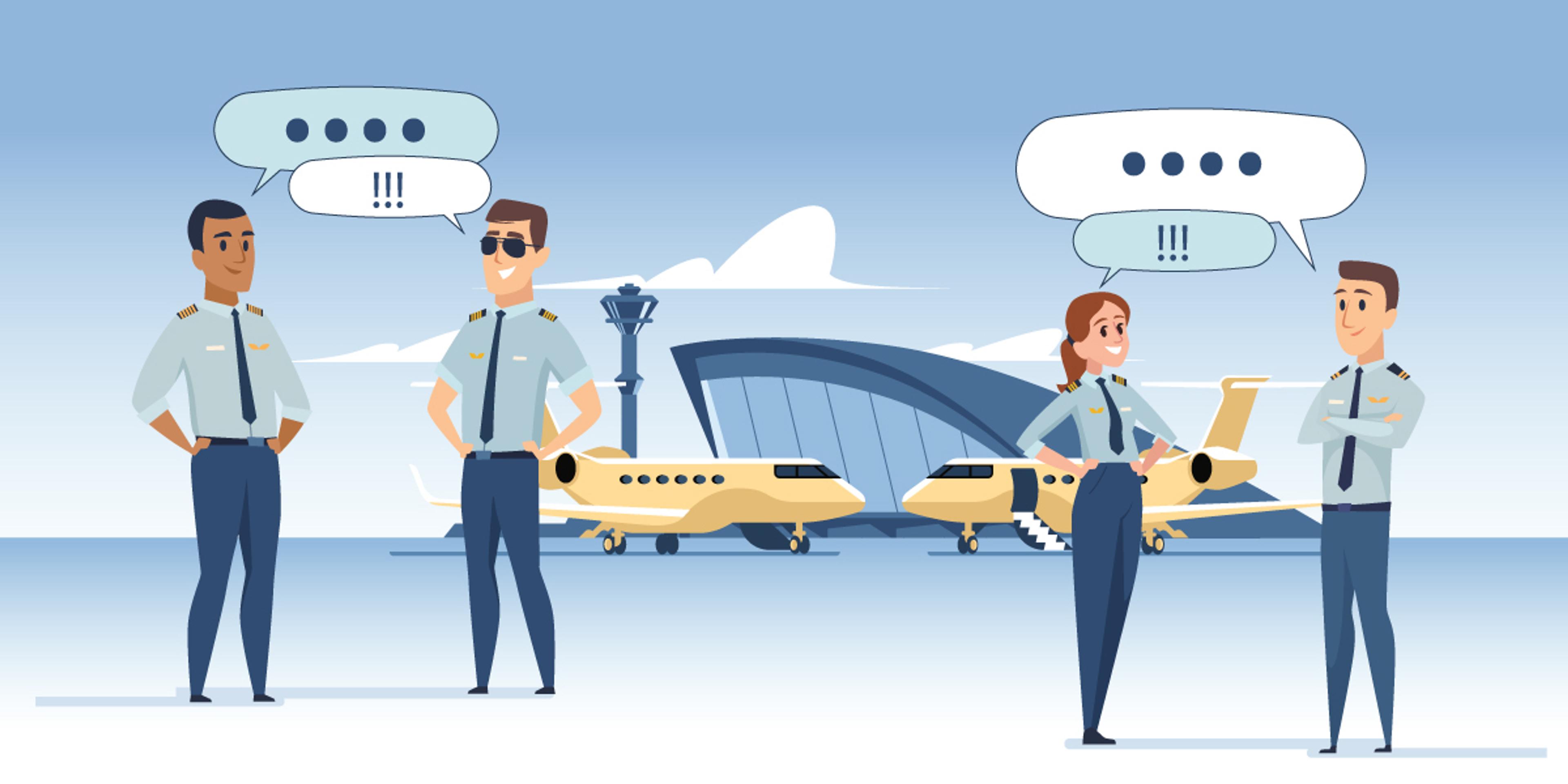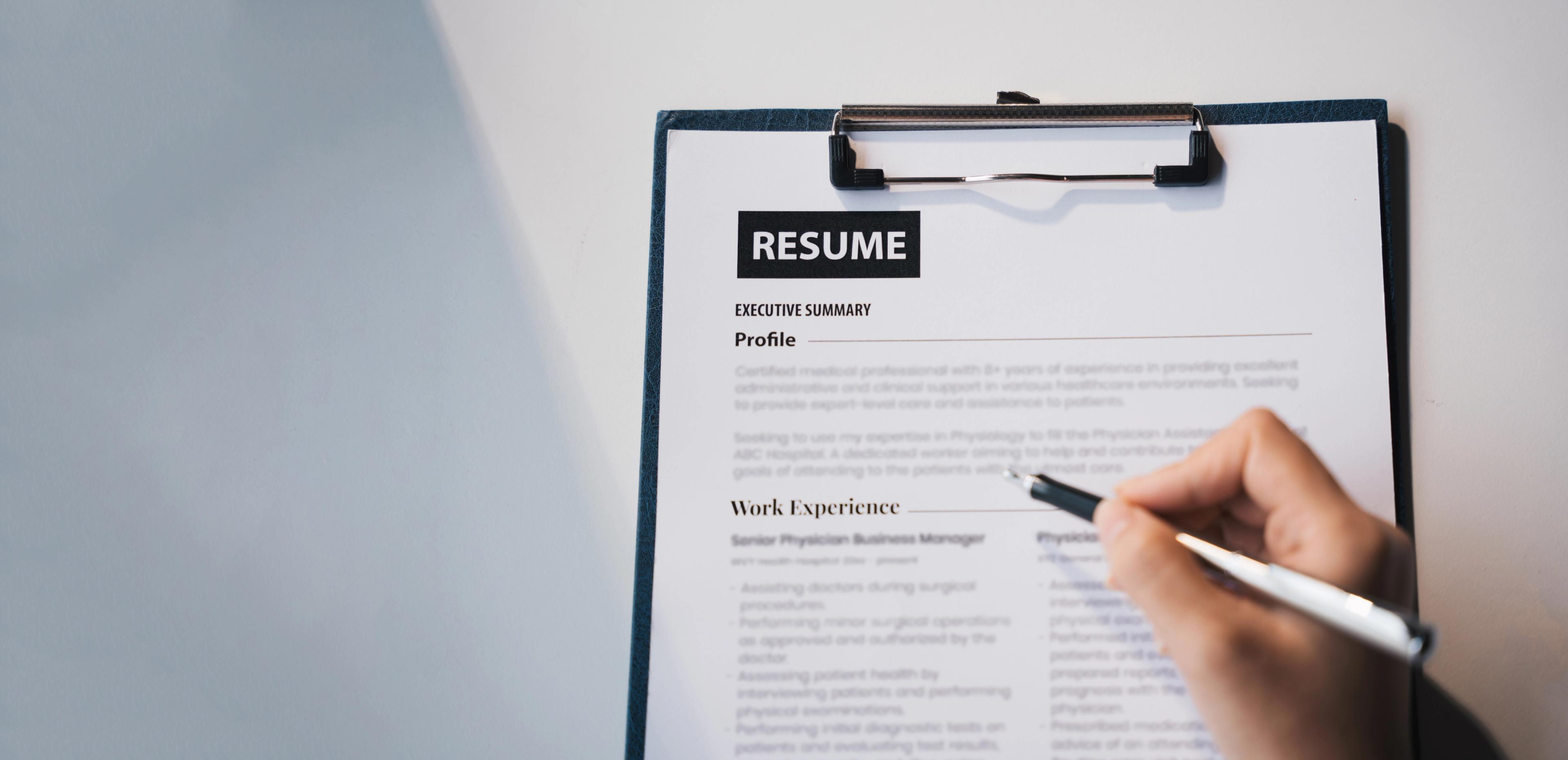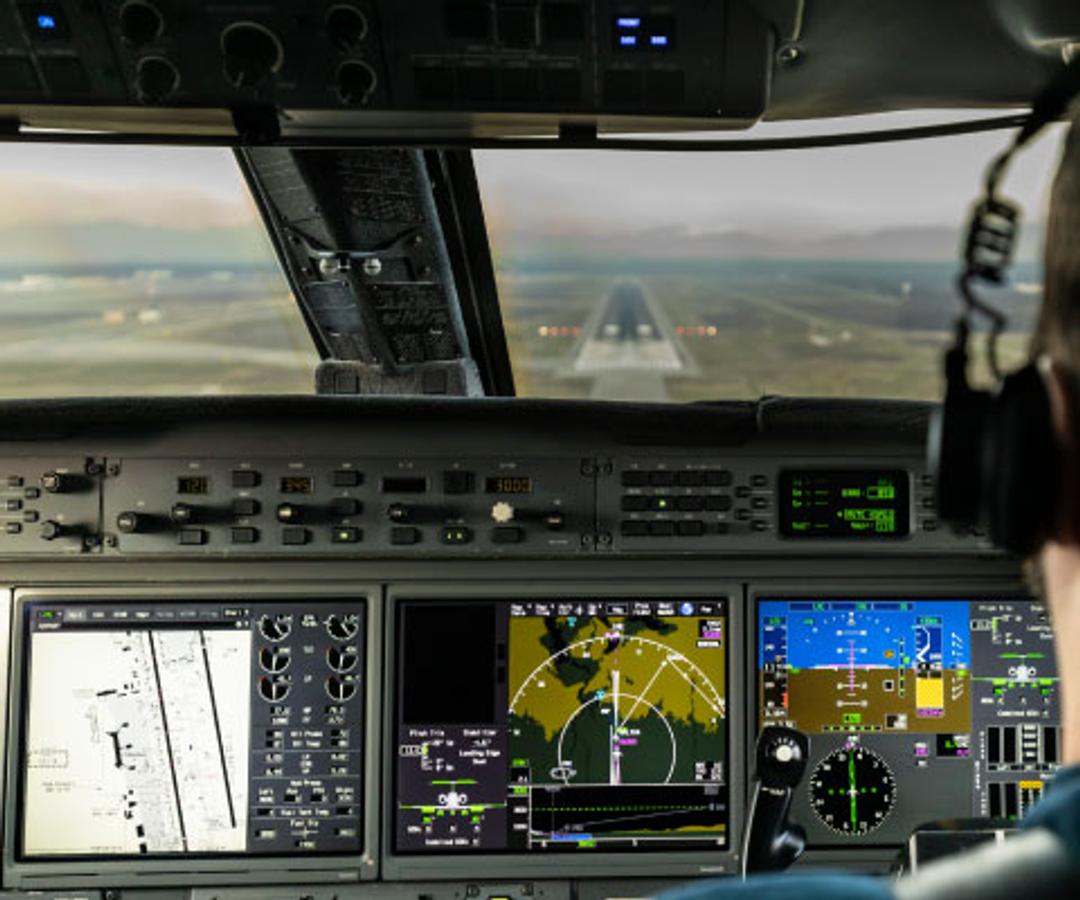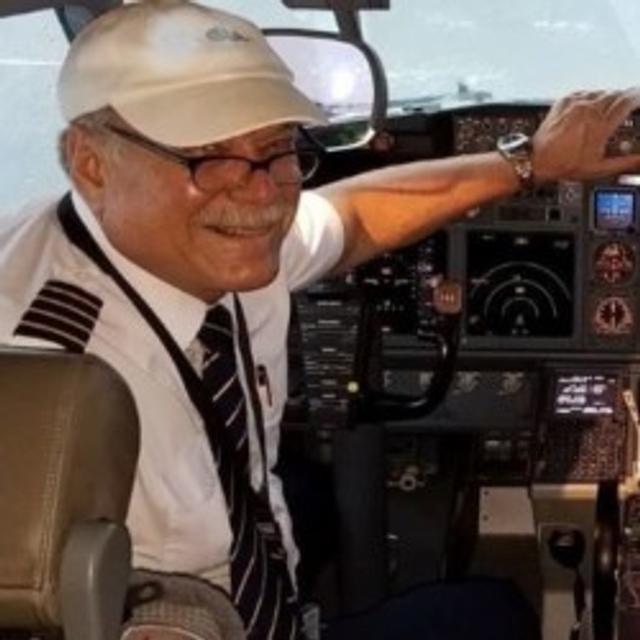

Bill Ermolovich, a retired airline pilot and longtime BizJetJobs member, recently spoke with our staff about how much he enjoyed using our service. He's landed multiple jobs using BizJetJobs, so we asked him to sit down for an interview to offer guidance to other pilots seeking employment, especially those retiring from the airlines.
Not only did Bill appear in the original Top Gun movie as an extra, he retired from the Navy with 20 years after flying the F-14 Tomcat, and Delta Airlines as a Captain after 30 years. He has also helped many retiring pilots make the transition to post-age-65 flying. He regularly refers pilots who want to go Part 95/135 to us at BizJetJobs, because he believes it's the best service to connect retiring pilots to corporate or "business jet" jobs. Thanks, Bill!
For Bill, an international job made the most sense. He was able to find several BBJ/737 jobs. But when it comes to a post-airline career, every pilot's needs and desires are different. Some pilots want to be home every night. Others want to see the world. Some aren't quite ready to hang up their headset but want a more relaxed schedule. Others need the income. Still others are happy flying as a tour guide. At BizJetJobs, we've found that for any aspiring post-65 airline pilot, knowing the number one reason for your job search always leads to the best fit.
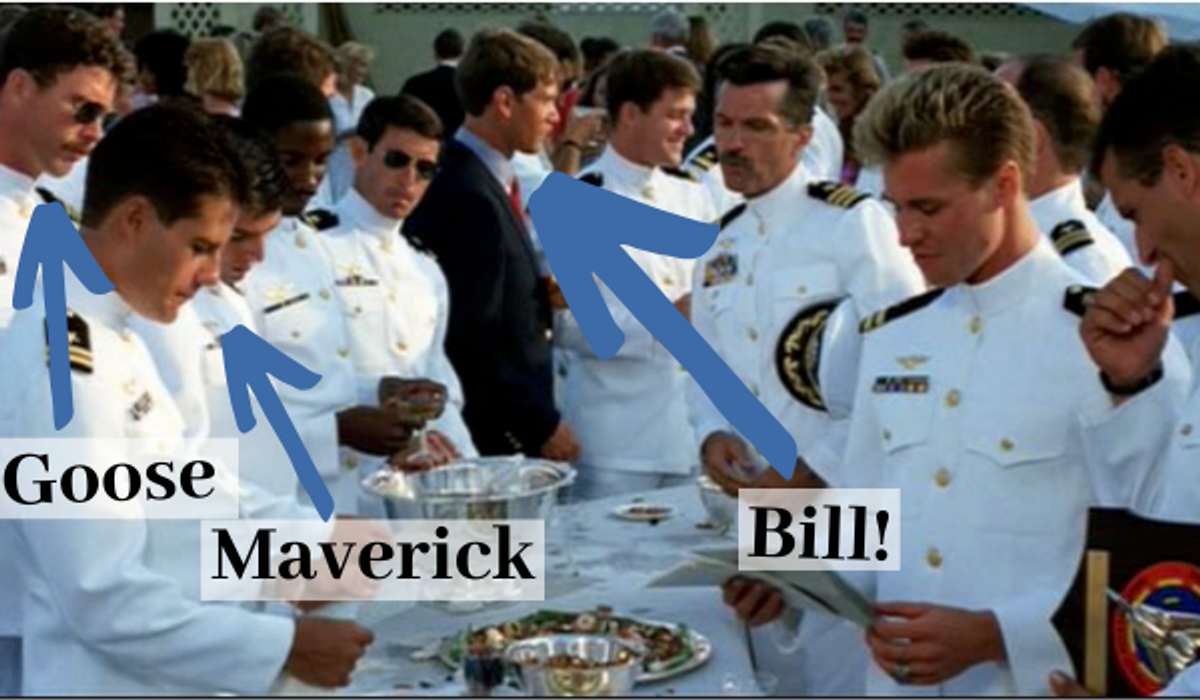
BJJ: What made you decide on the position you took?
Bill: I’ve had four business jet (corporate) pilot jobs since I retired from the airlines, and three out of four of those positions were on the BBJ/737NG with one on a new type (the Phenom 300). I did my homework but I was also extremely lucky because these larger aircraft are rare in Part 91/135 flying. It's rare for high net worth individuals to fly in anything bigger than a BBJ, and the royal families tend to hire people aged 45 and younger. It's best if you already have a type rating in a corporate aircraft, like a BBJ/737 Falcon or Gulfstream, and start out with Part 91/135 operators in the U.S. like NetJets or Delta Private Jets.
Keep in mind that since 2014 by ICAO rules pilots over age 65 cannot operate aircraft in a Part 135 (non-scheduled charter and air taxi) operation internationally. Domestically in North America, pilots older than 65 are allowed to fly in both Part 91 and 135 operations.
Bottom line is that for international operations, pilots older than 65 must fly for a private individual (Part 91) only.
BJJ: For pilots looking to stay close to home, or who want to fly part-time - what would you recommend?
Bill: The airline jobs are relatively stable with an HR department and union to assist in job protection for pilots. In Part 91/135 private jet operations for light to medium jets, pilots have to load bags, clean the toilet, clean the cabin, and do whatever it takes to keep the customers happy. For those lucky enough to fly medium to large jets, the flight attendants usually clean the cabin. Pilots oil the engines, load bags, and work outside the jet.
Internationally, some jobs allow commuting 30 days on and 30 days off. Other jobs may require you to live in country.
A lot of airline guys went to college of their choice, then worked for the airline of their choice. When you walk into a Part 91/135 for the first time, you might find that Crew Resources Management (CRM) is marginal. You, as a new hire, are most likely a second-in-command (SIC) and your opinions and advice are not always appreciated. Remember what it was like as a new hire at the airline. That is your new lot in life, so be supportive without making your Pilot in Command (PIC) feel uncomfortable with your input. Support your PIC without stepping on his command of the aircraft. Take all the changes in stride.
Very important: do not go out there and buy a type rating in one of the smaller to medium private/business jets. A type rating is only worth something if you have a job. You'll have to pay for recurrent on top of the initial investment of $100K plus for a Gulfstream. Under Part 135 you will need recurrent training every six months at $50-90K. You should not do this to get your foot in the door.
You have to take what you can get when you first start out. It's hard to find work flying for about a week a month. You're going to start out working harder than that, but it's well worth it.
BJJ: How did you hear about BizJetJobs.com?
Bill: I found you back in 2016 while searching around on the Internet. That was very fortunate as your web site is the absolute best for job searches.
BJJ: Would you recommend our service for other pilots in a similar situation?
Bill: I recommend BizJetJobs to any pilot I talk to who’s looking to do something other than work for the airlines, or to do post-airline work. When you’re a pilot over 65, my experience was, "you take what you get and you don't throw a fit." If you do your homework and put in the time, you can find some great opportunities. There's not one specific career path for us after we retire from the airlines. I have been an Assistant Chief Pilot, Accident Investigator, Safety Program Manager and Line Check Airman. I've been in Management most of my aviation career. I spent ten years on active duty flying from aircraft carriers and ten years in the Naval Reserves, along the way working as Flight Instructor, Maintenance Officer, Safety Department Head, and Landing Signal Officer. These management positions also give a leg up on training and management jobs post airline.
For most of my 49-year aviation career, I was involved with international operations. But international flying isn't the only option if you're a retired airline pilot. There is good work out there working on simulators, as a flight instructor.
BJJ: What did you find most useful about the BizJetJobs.com website?
Bill: The job board is excellent. It's separated by aircraft type, position, and Part 91/135. I have all of my resumes and cover letters on my laptop, and I'll tailor them to the positions I want to apply for. I like the automatic cover letter BizJetJobs provides, and I update that occasionally as well. When I'm actively looking for a job, I send out as many applications as I can.
BJJ: What else did you try in your job search?
Bill: I Google searched all the owners of the aircraft in which I am typed. I sent letters to everyone, but I didn’t hear back.
BJJ: Why can an international job be great for retired airline pilots?
Bill: For pilots who have spent most of their career flying international, this is an easy fit and the most lucrative option. Extreme high net worth individuals recognize the experience and ability of high time international pilots, and they compensate much better than Part 91/135 domestic North American operations.
BJJ: Why do you think you got the position?
Bill: It was a combination of my flight time and my management experience. My employers wanted someone who knew standard operating procedures, International over-water (Class II navigation ), and who was very good with the technical aspects of flying. I think they could tell all of this is fun for me.
BJJ: Some retiring airline pilots we talk to are skeptical that once they retire that they'll be in demand. What does your current company appreciate about you? Do you think age is an issue?
Bill: My second-in-command is a 76-year-old retired United Captain, and has had multiple jobs for different people over the years. He lives in Guam so this current position is perfect for him. Two of his previous customers were the founders of Google, who he flew on a multi-week trip around the world. He is also a customer of BizJetJobs, and has been for many years. If you're retired, you need to be persistent and take whatever is offered to start.
In my opinion, the cream of the crop are flying for the airlines. Private jet employers are looking for people who are skilled like us.
But the starting pay at a domestic Part 135 or 91 as a Second in Command is not enough. You will go broke if you have to rely on it. They can decide out of the blue that they no longer want or need you, and turn around and hire a younger guy.
BJJ: What's the best thing about your current job?
Bill: My current Part 91 private jet job is a full-time position with medical, dental, and all the benefits you’d have at the airlines. There is also 28 days of paid vacation each year and a business class seat for the vacation. The pay is fantastic, and the flying is absolutely wonderful. I love going to places I’ve never been, and I am living in a fantastic country outside the U.S.
The Final Analysis
Bill's situation is unique. He is not tied down because of young family. His family can visit him, and he can travel home quite often in business class (by contract). A lot of his advice will work, but the bottom line for retiring airline pilots is you just have to keep plugging away and trying.
"Even when you have a job," says Bill, "you have to keep applying. You’re not an ALPA Union member. You don't have an HR department to protect your job. The owner can sell the aircraft, the accounting department can object to the operation, or you can displease your owner or a passenger, to your detriment.
A good way to conduct yourself is to be conservative while getting the owner to their destination. Remember you are one bad landing from being out the door. Stay under the radar, do your job, and keep your eyes open for any opportunities. The sky's the limit."
---
Have questions about retiring from the airlines, looking for full-time corporate pilot work or becoming successful as a contract pilot? Call us at BizJetJobs today! We are here to help.


